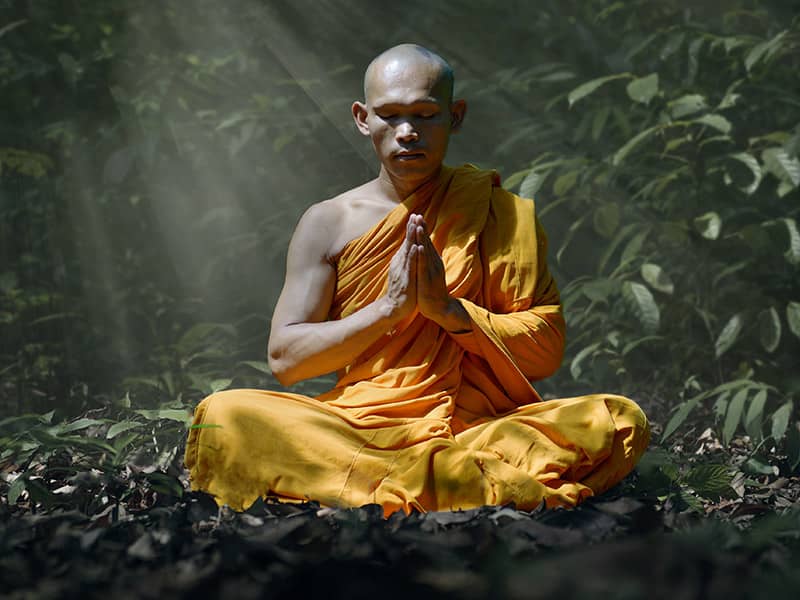
Observed by Mahayana Buddhists on the 15th of February, Nirvana Day is an annual celebration that commemorates the historical Buddha’s entry into final nirvana upon the death of his physical body at age 80.
The Buddha
The Buddha, whose historical name was Siddhartha Gautama, was born in Nepal around 2,500 years ago. Siddhartha was a member of the royal family of a kingdom on the Indian-Nepalese border, and although he had an ostentatious upbringing, he was shocked out of his privileged life upon realizing the truths of aging, sickness, suffering, and death. This led him to contemplate the meaning of life and the cause of human suffering, eventually driving him to leave his palace and follow the traditional Indian path of the wandering holy man.
He went on to study and master meditation under various teachers, taking on an ascetic lifestyle, believing that one could free the spirit and invite understanding by denying the flesh. Unsuccessful, he abandoned this path, looking to his own mind and intuition for the truth—he decided to learn from direct experience. He sat beneath a pipal tree for 40 days, when he finally attained Enlightenment.
For the remainder of his life, the Buddha traveled, spreading his newfound understanding to others, founding Buddhism.
Siddhartha finally passed away after a life of traveling, teaching philosophy, and developing Buddhism until his death at the age of 80. Before he died, he imparted a few well-known final words to his monks that would go on to give Nirvana Day its theme.
"Behold, O monks, this is my last advice to you. All component things in the world are changeable. They are not lasting. Work hard to gain your own salvation."
The Nature of Nirvana
Buddhists believe that Siddhartha, when he became enlightened attained a state that was free of conditions—things like upbringing, psychology, perceptions, opinions, presuppositions, and so on. This is known as sopadhishesa-nirvana—“nirvana with remainder”. Upon his death, however, he achieved parinirvana, which translates as “final nirvana”.
This final nirvana is achieved by one who has attained nirvana during life, and with it, comes the ultimate reward—release from the cycle of suffering, death, and rebirth.
This is achieved through adherence to Buddhist precepts, most notably the Noble Eightfold Path, which consists of eight practices—right view, resolve, speech, conduct, livelihood, mindfulness, and Samadhi, and effort. These practices, when fully and purposefully integrated into an individual’s life, result in liberation from the cycle.
But when a person who has not achieved nirvana during his or her lifetime passes away, losing their physical body, their unresolved karma stays with them as they are reincarnated, bringing them back into one of the realms of rebirth, which range from a hellish plane to the heavenly realm of the gods. A person’s choices during life determine where they’ll be reincarnated, and an individual can move up and down the hierarchy of realms over the course of centuries.
However, there is release and rest for those who have achieved the ultimate Buddhist goal. Nirvana means “blowing out,” or “quenching,” and is achieved through a life lived as the historical Buddha did—through extinguishing the “three fires of passion, aversion, and ignorance. This different from total annihilation—the individual who passes into final nirvana simply passes into another, unknowable realm of being.
The Dalai Lama defines Nirvana as the “state beyond sorrows,” or a “state of freedom from cyclic existence”. Mahayana Buddhists seek to aid others in achieving this state. Devotees focus on becoming bodhisattva—people who strive to liberate others from the cycle of birth and death, postponing their own entry into nirvana for the purpose of helping the rest of the world.
Observations
Buddhists observe Nirvana Day with solemn meditation and readings from the Parinibanna Sutta, which describes the last days and words of the Buddha.
This religious holiday is also a time for pilgrimage. Because the Buddha is said to have passed away near the city of Kushinagar, located in what is now the state of Uttar Pradesh in India, Kushinagar is a major destination for Buddhists during Nirvana Day. There are a number of shrines in Kushinagar, including the Ramabhar Stupa, which marks where the Buddha is thought to have been cremated, and the Nirvana Stupa, which marks the spot where the Buddha’s ashes may be buried.
Some Buddhists treat Nirvana Day as a social occasion, preparing food and gifts to share with others at their monasteries.
It may seem counterintuitive that the adherents of a religion would celebrate the death of their beloved founder, but the essence of Nirvana Day lies not in the idea of death, but in freedom. It is a time to think on, and more importantly, accept, the impermanence of everything. It is often encouraged to think on the recent deaths of friends and loved ones in order to accept their loss, and to learn not to grieve over such things.
Instead, Buddhists are encouraged to live full and joyful lives through the acceptance of impermanence and freedom from attachment.
Unattached and Unafraid
Buddhism is a belief system that is focused on the elimination of suffering—both the suffering of adherents, and of all other forms of life. While dwelling on the idea of death and impermanence may seem depressing at first glance, give it a try on Nirvana Day. Think not on what you’ve lost, but dwell on the very nature of life as something that constantly changes and shifts.
Accepting this aspect of life bears much significance for our contemporary lives. It is in this contemplation that you may begin the process of becoming able to accept change in your life—something we all struggle with.
Buddhists remind us that through acceptance, cultivating discipline, and practicing mindfulness, we can achieve happier, healthier lives, setting us on a path that does both us, and those around us, good.
And who knows? One day, that path may one day lead us to nirvana.

